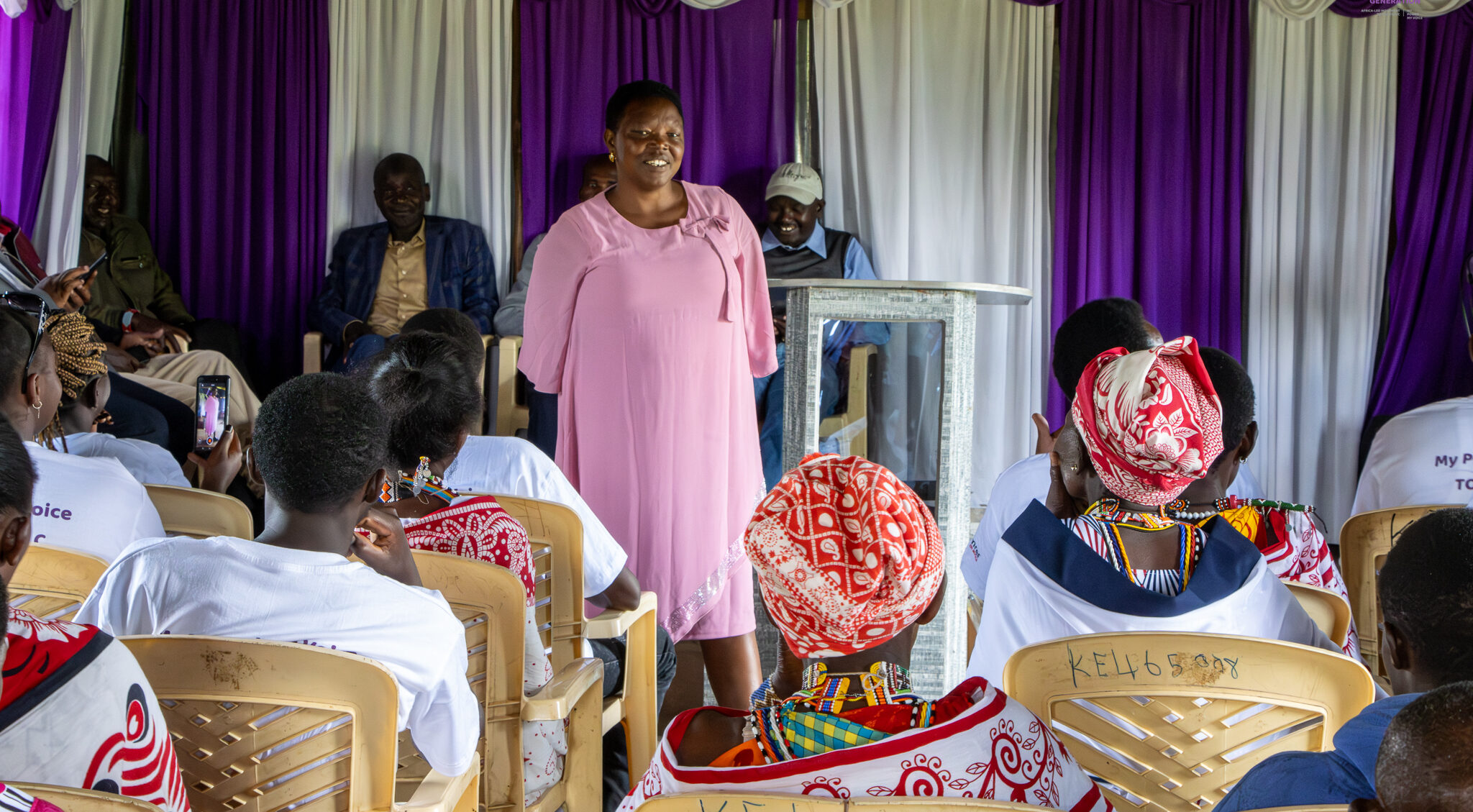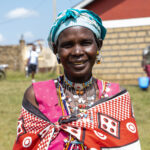Mrs. Ipato Serum was appointed the Chairperson of the Anti-FGM Board in Jan 2023 by H.E President William Ruto. One of the roles of the board is to uphold the dignity and empowerment of girls and women in Kenya through the coordination of initiatives, awareness creation, and advocacy against female genital mutilation/cutting (FGM/C).
We found her engaging with communities in Narok through Amref Health Africa, a consortium partner of TGG-ALM. We spoke with Madam Ipato about the 2022 KDHS, strategies that are working towards the elimination of FGM/C, and what more needs to be done to safeguard the next generation from undergoing FGM/C.
Read on and learn more from Madam Ipato’s views on ending FGM/C in Kenya.
Over the past decade, the national prevalence has decreased from 21% to 15%. What factors do you believe contribute to this notable reduction?
One of the reasons the numbers have dropped is the increased educational forums undertaken by the Anti-FGM/C board and its partners among target groups. I can also say that most of us, who are survivors, were trained and reached with knowledge in the last 10 years, that has informed us not to subject our daughters to this violation. Additionally, engaging key target groups like survivors, youth, and men has seen more people reached with relevant information.
What would you say are some of the strategies that are working in the communities that practice FGM/C?
The strategies that are bearing fruits include engaging religious leaders, who in turn share the information in various gatherings such as churches and mosques. Since FGM/C has in the past been associated with religion, when religious leaders who are well informed about the negative effects of FGM/C on women and girls, in turn, use that information to reach their audiences and masses, the majority are bound to change.
We are also seeing an increased engagement of survivors of FGM/C in the forefront. Many women are now speaking against the practice and vowing not to subject their daughters to this violation, which is a plus, especially in safeguarding the next generation. Survivors understand the pain and are bound to carry the trauma of FGM/C for the rest of their lives. Young women who have not undergone FGM/C are also coming out to speak boldly and are overcoming the stigma that would otherwise hold them back.
Another strategy that is working is engaging men and boys in the communities. Unfortunately, a lot of household decisions are domiciled in men, and we need to engage them as allies in ending FGM/C movement.
What are your thoughts on certain key messages that may be causing harm to both survivors and individuals who have not experienced FGM/C?
As we intensify campaigns towards the end of FGM/C, we should be sensitive to the audiences, both those who have undergone FGM/C and those who have not. For example, it is wrong to say that those who have gone through FGM/C should not get married, this leads to stigmatization of survivors, who went through the cut, for them to find suitors. This is not a realistic message. Instead, let’s use the voices and experiences of survivors to safeguard the next generation, and be on the lookout for girls and young women.
What would you say would be a key role of the survivors’ network?
Survivors of the FGM are within the community. The role of the survivor is mainly to sensitize and get that strength to speak out to say, this is not good and this is a problem that happened to us unaware and it should not happen again. To sensitize and do mentorship on other fellow girls or other fellow women is their role. I was in Transmara, I found a big problem not only girls that are being targeted but even women; women who have children and have been married for more than 5 years still undergo FGM/C. So for the survivors, I believe they are very important to be at the forefront because they know the pain, they have seen the light, and they have been trained and they now know that it is possible to secure other girls and women from undergoing FGM/C.
Having engaged with numerous reformed cutters, what, in your perspective, drives the transformation of their mindset and heart?
A combination of strategies comes into play. For example, unlike years ago, FGM/C is no longer celebrated in communities through events. The law has made it clear that FGM/C is illegal and must stop. This has seen several cutters fear being arrested and prosecuted. Another strategy is awareness creation. The more people are speaking, the more they see the need to stop. Religious leaders, survivors, and government-led initiatives have seen many of them reform.
There’s no one strategy that I can say enables one to reform, but a combination of strategies; takes time as people do not get reformed at the same time.
What is your take on the idea of economic empowerment for reformed cutters?
It doesn’t work because to me, I take a circumciser as a criminal, so it is like assisting someone who has been stealing your sheep, you open a business for them not to come and steal your sheep. But will that work? There is nothing like giving anything of benefit to the circumciser. Let them reform and get into forums like any other women who are not doing that. There are several processes for funding women’s groups and getting assistance there. I do not agree with the issue of financing circumcisers not to circumcise because it is a criminal activity.
In your view, what additional actions or initiatives do you wish to witness from CSOs and partners to enhance their support for government endeavours in eradicating FGM/C?
Our partners are doing a great job like getting out of the offices, going to the ground, and spending a lot of resources, even risking their own lives while going to the ground. These are great sacrifices from our partners. I would still insist that if you are given a target area, try and go deeper to the ground and make the campaigns more vigorous because we still have the challenge of FGM/C.
By Ann Njuguna, The Communications Manager for TGG-ALM


